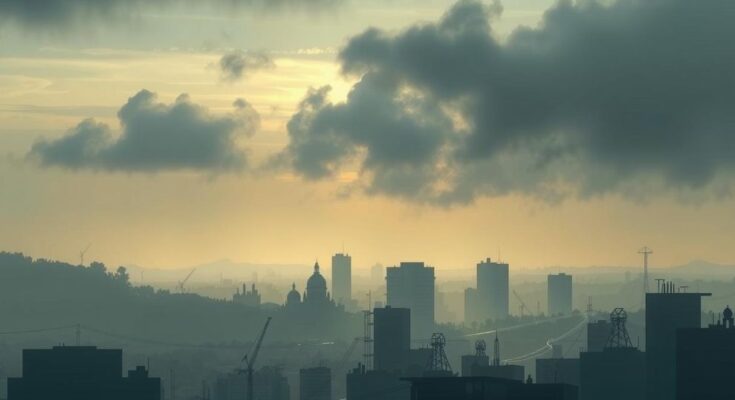Goma, a city in eastern DRC, has fallen under M23 rebel control, following violent clashes that resulted in numerous casualties. Despite everyday activities occurring in the city, fear prevails among residents who remain wary of the rebels’ presence and the potential for escalating violence. Hospitals are overwhelmed with wounded, and human rights concerns, including sexual violence, are rising amid conflicts. The Congolese government disputes the occupation, affirming intentions to reclaim the territory from the rebels.
The situation in Goma, a city in the eastern Democratic Republic of Congo (DRC), reveals the stark reality of life under the control of the M23 rebel group. Upon entering the city, signs of normalcy persist, with residents going about their daily routines. However, the presence of M23 fighters is unmistakable, as they man checkpoints and patrol the streets following their recent capture of Goma. Amidst this control, violence has escalated, leading to significant casualties, with reports of at least 700 dead and nearly 3,000 injured during clashes with government forces.
Doctor Nathaniel Cirho, now a patient himself, described the aftermath of a bomb blast that left him injured and resulted in the death of another victim. His hospital, along with others, is overwhelmed with patients suffering from serious injuries, including gunshot wounds. Additionally, the UN has raised concerns about the rise in sexual violence as a weapon of war amid the conflict. Facilities are struggling to treat the influx of victims, receiving around 315 patients in a single day despite being ill-prepared for the surge.
Goma’s streets reflect both hope and fear; while some businesses have gradually reopened, many residents remain concerned about safety and stability. Shop owners have noted a decrease in customers as some residents have fled to neighboring countries for safety. The M23 rebels have asserted their dominance, taking over key government offices while Congolese soldiers appeared absent, highlighting the precarious security landscape. Reports indicate that the rebels are advancing southward towards other major cities, raising alarms about potential further territorial gains.
Amidst these developments, the Congolese government continues to dispute the legitimacy of M23’s claims, insisting on recovering lost territory with the alleged support of Rwanda. The government’s stance indicates an unwillingness to concede control, yet the rebels’ presence in Goma demonstrates a significant shift in the region’s balance of power. As the conflict evolves, the resilience and fears of Goma’s residents encapsulate broader tensions within the eastern DRC, underscoring a critical situation that warrants international attention.
The ongoing conflict in eastern DRC is marked by the presence of various rebel groups, including the M23, who have captured substantial territory and posed a challenge to the Congolese government. The M23, originating mainly from the ethnic Tutsi community, claims to fight for minority rights but is accused by the government of pursuing control over valuable mineral resources. The situation in Goma, a densely populated city, serves as a focal point for the ongoing violence, displacement of people, and humanitarian crises resulting from conflict. The United Nations has been involved in monitoring human rights violations, including increased incidents of gender-based violence during ongoing hostilities.
The situation in Goma starkly illustrates the dire impact of ongoing conflict as the M23 reinforces its control over the city, highlighting severe humanitarian consequences and escalating violence. While some semblance of daily life continues, fear and uncertainty dominate the residents’ experiences, exacerbated by the significant medical needs and ongoing threats of further rebellion. The Congolese government faces mounting challenges while affirming their intent to reclaim lost territories, thus emphasizing the urgency for international attention and intervention in this multifaceted crisis in eastern DRC.
Original Source: www.bbc.com




